First published
On January 1st, the Xué Xí Qiáng Guó app was launched on various Chinese app stores. The app is an initiative by the Propaganda Department of the Central Committee of the Communist Party, and is linked to the xuexi.cn platform, which was first set up in 2018.
The app has been making headlines in Chinese and English-language media this week. The BBC referred to the app as a “little red book,” and reported that members of the ruling Communist Party, as well as state-owned company employees who are not Party members, have allegedly been required to download and use it on a daily basis (Feb 15).
The Guardian reported that government officials in Fujian province and Qingdao city held workshops last month stressing the political importance of the app, and directing local leaders to promote the app across government departments (Feb 15).
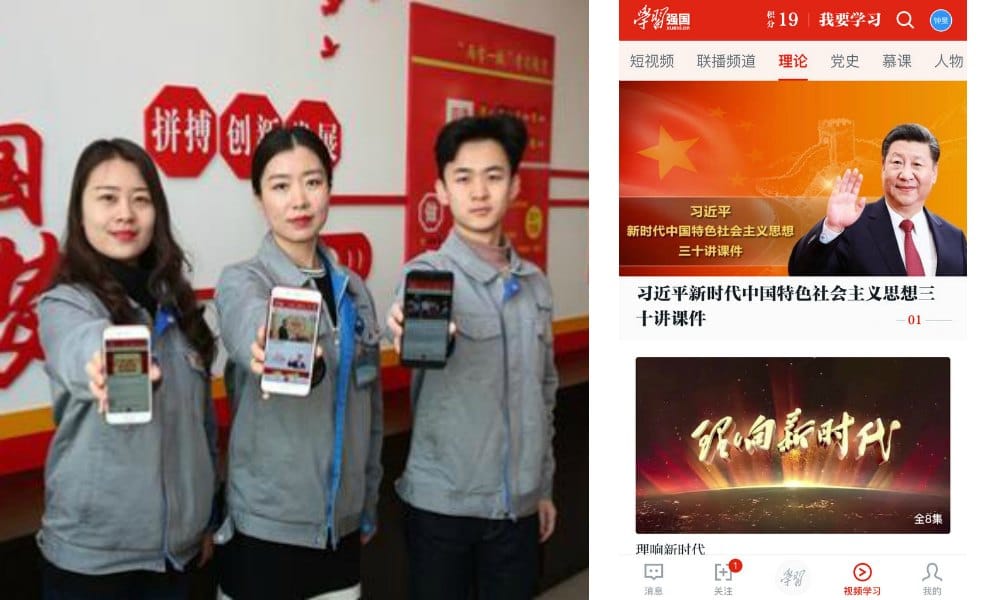
Although some reports claim that the app is making its way to top lists of most downloaded apps in China, it only scored a position 72 in the top 100 list of popular Chinese app store 360app at time of writing. The app store does state that the app has been downloaded 340000 times, with app users rating it with 2,5 stars out of 5. In the Tencent store, the app was downloaded 2,1 million times.
However, these numbers do not necessarily indicate much about the total number of downloads, since the app can be directly downloaded as an APK file from various locations. In the Chinese Apple store, the app is now the number one scoring app in the educational category. The app is only available in Chinese, and is not available from the Google Play store or Apple stores outside of China.
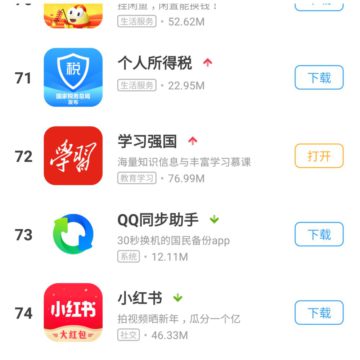
The app’s name (学习强国) is translated as the ‘Study Xi Strong Country’ app in various English-language media reports, but a more suitable translation would perhaps be ‘Study Xi, Strengthen China.’1 There’s a wordplay in the name, since the Mandarin word for ‘studying’ is ‘xuéxí’ which also incorporates the name of Xi, and in this context means both ‘Studying’ as well as ‘Study Xi.’
The main slogan of the ‘Study Xi’ app is one of Xi’s own sayings: “Dreams start with studying, careers start from doing” (“梦想从学习开始,事业从实践起步”, loose translation). Both the idea of ‘Dreams’ and of ‘Studying’ are concepts that are consistently promoted in the Xi era, with the idea that the common dream of the people is the ‘Chinese Dream’ of bringing about the “great rejuvenation of the Chinese nation.” Within this Chinese dream, studying is generally promoted as a “secret weapon” that will strengthen the Party and the nation (Xiao 2016).
A Multi-Functional Propaganda Tool
So what is the ‘Study Xi, Strengthen China’ app? It basically is a multi-functional educational platform that offers users various ways to study Xi Jinping Thought, Party history, Chinese culture, history, and much more. Once people are registered on the app, they can also access the platform via PC.
An important part of the app is its news feed: its home page features “recommended” reads that all focus on Xi Jinping and the Party. Another major feature is its ‘quiz’ page: every week, there are different quizzes that users can do, relating to all sorts of things, from Party ideology to famous Chinese poems.
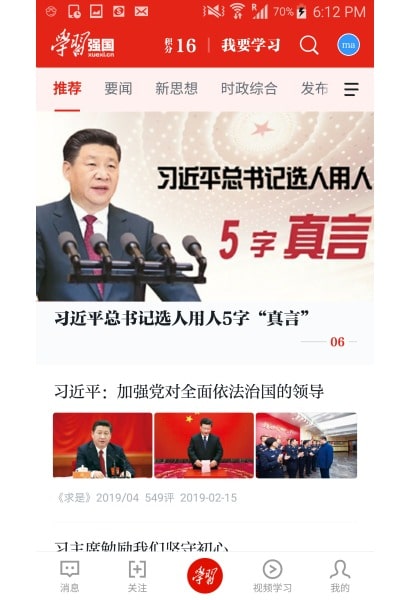
We’ve listed some of the app’s functions below. It is much more than a media app alone; it also has a social function, that allows users to connect with friends, message them, call them, and even send them ‘red envelopes’ (money presents).
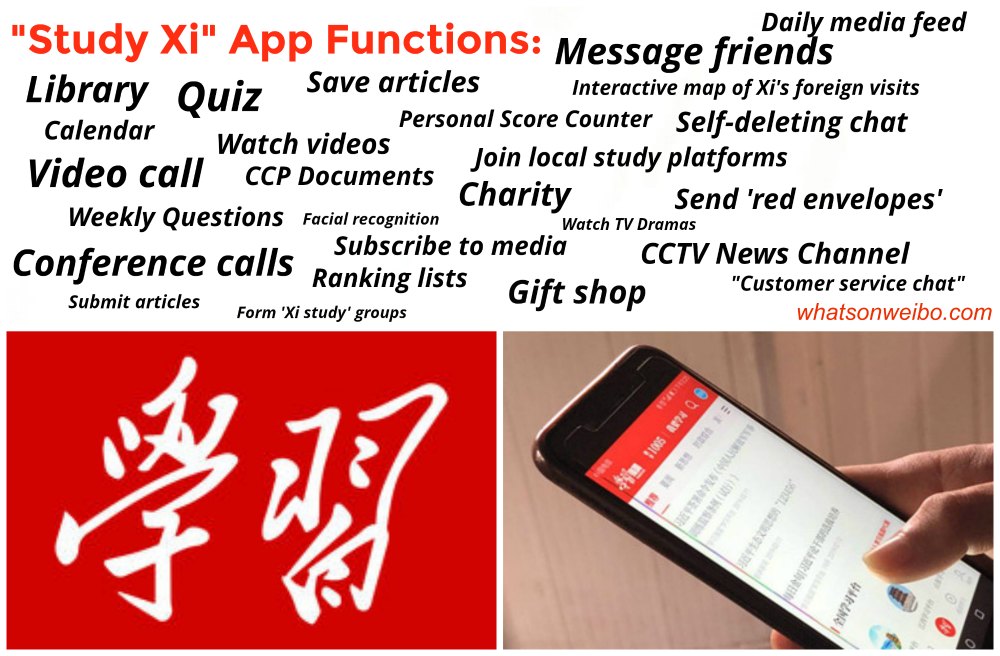
The ‘red envelope’ function is made possible through Alipay, the online payment platform that is owned by Ant Financial Services Group, an affiliate company of the Chinese Alibaba Group.
One way for users to verify their identity on the app is also by linking it to their Alipay account. Various media reports also claim that the app is linked to Alibaba’s Ding Ding platform, an enterprise chat app that has a multitude of functions, many of which are also incorparated in the ‘Study Xi’ app (for more about Ding Ding, see our article here).
Given the cooperation with Alibaba, it is perhaps not surprising that upon registering for the app with just my phone number, it already knew my nickname without me putting it in. The app also listed an old smartphone I used some two years ago as a “frequently used” device, although I had just downloaded the app the day before and had never registered for it before.
So I just registered for the first time for the new “Study Xi Strong Country” app, which requires a phone number. It then told me “hi manyapan,” and that this phonenumber was already registered for the app. I’ve never registered before and never put in my manyapan nickname. 🤔 pic.twitter.com/8WQWq3D46T
— Manya Koetse (@manyapan) 16 februari 2019
“Study Xi” app day two. Not only did the app know my nickname upon registering for 1st time, it also lists a HTC phone I used some two years ago under “frequently used devices.” Most likely imports data from Alipay app. pic.twitter.com/qQ9Sdgk3Fp
— Manya Koetse (@manyapan) 17 februari 2019
Twitter user @yanshitou12 also noted that, upon using a friend’s number to register for the app, her Ding Ding conversations were automatically loaded into the chat history, suggesting that Alibaba’s Ding Ding is indeed fully integrated with the app.
My phone cn number expired, so I used friend’s number. The app automatically loaded her conversation history from the app 针针, on my phone, without even asking
— 盐石头 (@yanshitou12) 16 februari 2019
Like Ding Ding, the ‘Study Xi’ app also allows users to set up conference calls, send ‘self-deleting’ chats (like Snapchat), and use the app’s calendar function. Its many practical functions make this an app that is especially convenient for China’s 89,5 million Party members to stay close to the Party and its activities.
How to Score with Xi
The app’s most noteworthy and perhaps also most appealing feature is its scoring system, since it turns studying Party ideology and Xi Jinping Thought into a game.
Those who accumulate enough points can get an item from the app’s ‘prize shop.’ There are also contests which users can join to compete over a Huawei tablet or other items.
One Weibo user shared that she had just received her Modern Chinese Dictionary by mail through the app’s ‘gift shop,’ another person expressed her surprise that a delivery man came to deliver her prize at her door. “Thank you, Propaganda Department!”, she wrote.
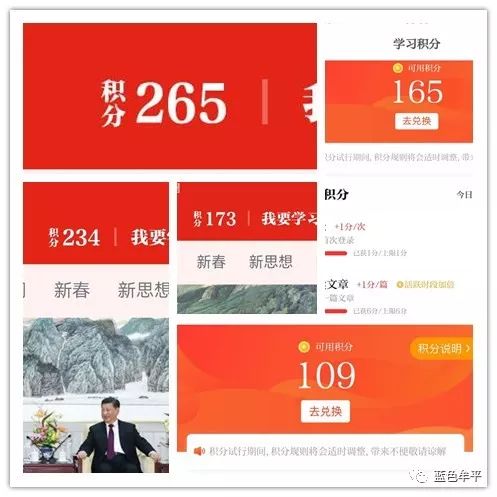
The score system works as follows:
- Upon registering for the app, you receive 1 point.
- For every article or essay one reads, you get 1 point (one per article, does not work with articles that have already been viewed before).
- For every video you watch you get 1 point (the same video won’t be credited with an extra point if you see it twice).
- The time you spend on the app is also rewarded with points: for every 4 minutes of reading, you get 1 point (max 8 points per day).
- For every 5 minutes of watching a video, you get 1 point (max 8 points per day).
- You get 1 point for “subscribing” to a media account, which will then show up in your news feed.
- If you share two articles with friends, you get 1 point.
- You get 1 point for every two articles or essays you ‘save’ within the app.
- If you score 100% on a quiz, you get 10 points.
What is quite remarkable about the app, is that it encourages users to ‘Study Xi’ at particular times of the day. The morning 6:00-8:30 timeframe, along with the 12:00-14:00 slot and evening 20:00-22:30 times, are designated as so-called “active time slots” during which users can score double points for their activities. Within these time slots, reading an article would, for example, grant a user 2 points instead of 1.
This signals that, in line with good working morale, people are supposed to look into the app during their morning commute, their lunch break, and before bedtime, and are indirectly discouraged from using it during (office) working hours.
The points that are scored on the app will be valid for two years.
On Weibo, some netizens are quite serious about the ‘gaming’ aspect of this app, and have already found ways to cheat the system. They share tips and tricks on how to score within the app: points are credited within 10 seconds of clicking an article, for example, and watching videos can be easily rewarded with a point if one immediately scrolls to the end.
Through the PC version of the app, it is easy to let certain videos play while scrolling the internet, basically earning points without actually watching the videos.
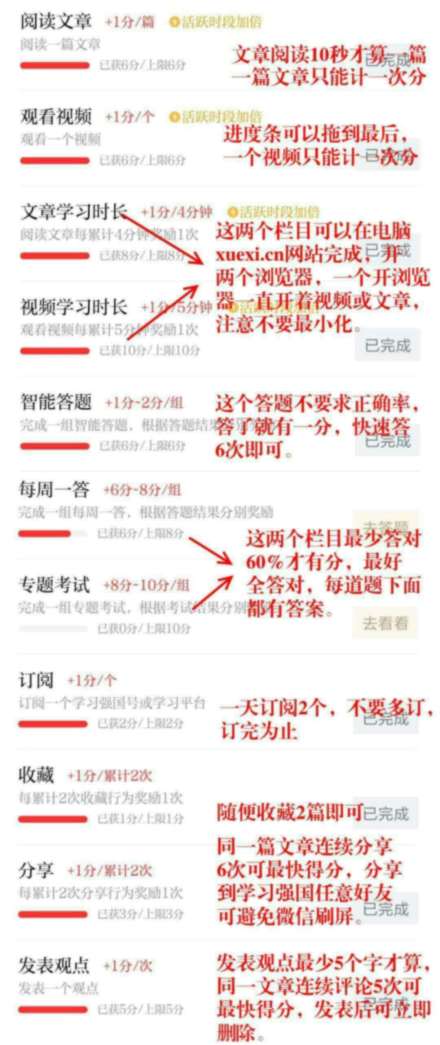
“Thanks,” many commenters reply to these cheating tricks: “Just what I was looking for.” “I already received 50 points in one day!”
A Library in Your Pocket: Media, Books, Movies
The ‘Study Xi’ app focuses on some dozen media outlets that users can subscribe to and which also show up in the ‘recommended’ homepage feed.
Incorporated in the app are state media outlets China Daily (中国日报网), People’s Daily (人民网), Xinhua (新华), Qiushi Journal (求是网), China Military Web (中国军网), Economic Daily (经济日报), and others.
The app also incorporates local ‘Study Xi’ platforms, from Hubei to Jiangxi, from Shandong to Fujian.

Besides these media, the app also has TV channels people can watch videos on, from CCTV News to a special ‘Xi Time’ news programme, to various TV dramas, including Turbulence of the Mu Clan (木府风云) and Romance of Our Parents (父母爱情).
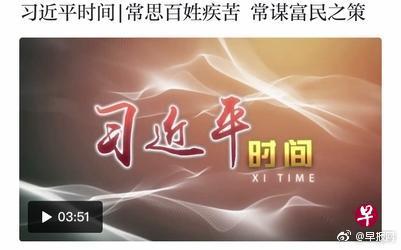
“Xi Time” news clips focus on the activities of Xi Jinping.
There is also a movie section within the app, where users can watch classics such as The Long March (长征), The Founding Ceremony of the Nation (开国大典), films on Deng Xiaoping or Zhou Enlai, and various movies that focus on the Second Sino-Japanese War.
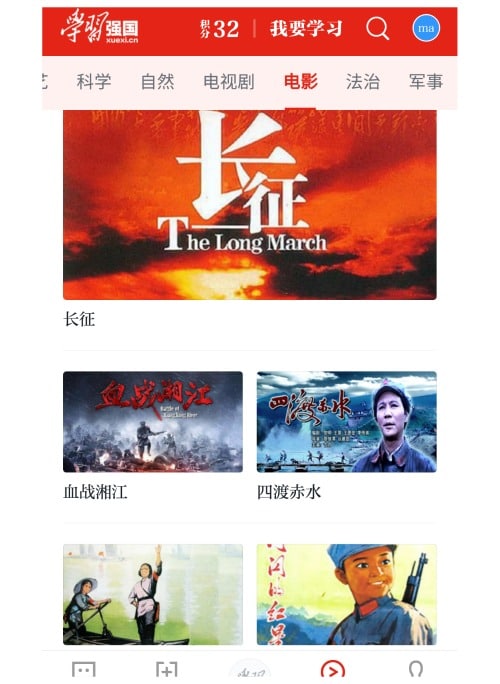
The ‘Study Xi’ library section grants users access to dozens of books. On the desktop version, the library is shown as an actual office, where you can click on the books that are displayed on the shelves and read them.

Some books are those by Xi Jinping, including The Governance of China (习近平谈治国理政), but there are also books by the famous Chinese author Lu Xun, or the 20th-century classic Rickshaw Boy by Lao She, and various works on calligraphy and poetry.
There is also an entire section of books available from a whole range of topics varying from astronomy to maths, biology, and geography. The books are available for online reading in pdf.
In general, you could say that the selection of media, videos, and books all fall into the categories of Chinese traditional culture and canonical literature, historical themes, science and technology, and the political themes of Party ideology and the Xi Jinping Thought that focuses on ‘socialism with Chinese characteristics’ (中国特色社会主义).
Those who read enough state media and Party articles will easily be able to do the quizzes and weekly questions in the app. Besides the standard ideological questions, it also draws from popular culture; I came across a question that used a trailer of China’s latest sci-fi movie The Wandering Earth that needed to be watched in order to complete the question.
Propaganda in the Xi Era
So how popular is the app, really? If the headlines in Chinese and non-Chinese media are to be believed, the majority of Chinese internet users are getting hooked on the app. That picture is perhaps the rose-colored one the Party would like to envision, but judging from social media comments and app ratings, reactions have been somewhat lukewarm.
On Weibo, there are some commenters who are sharing their 1000-point status on the app, or who say they enjoy looking into the app right before sleeping.
Dozens of commenters indicate that they have to assist their parents in using the app, or that it is not them, but their parents who are ‘hooked’ on the app – the majority of Weibo users are in the 20-35 years age group.
There are local trainings on making (older) Party members more familiar with the app, how to download it and how to use it. A local Chongqing community Weibo account recently posted the pictures below of their ‘Study Xi’ gathering.
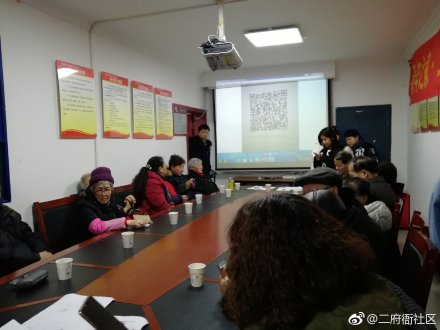
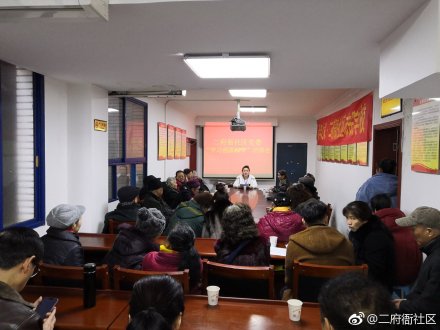
On social media, some commenters complain about the fact that the Chinese Apple store has turned off the review comment sections on the app, despite the fact that it allegedly scored a number one spot in its “educational app” section.
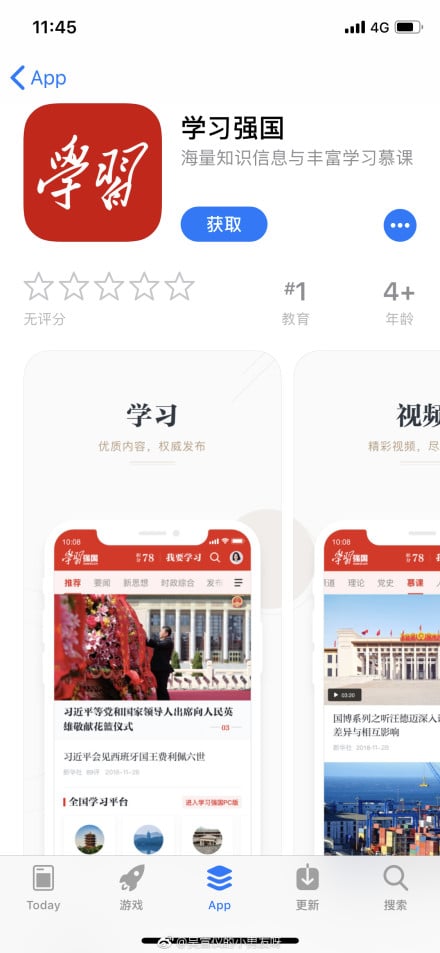
Then there are also dozens of commenters who say they often use the app: the score matters to them. In a time when everything is mobile, and online gaming is booming, it seems that ‘Study Xi, Strengthen China’ has made its app all the more relevant by adding the scoring element.
In doing so, the Propaganda Department of the Communist Party is continuing on the same route it has taken for the past couple of years, which shows a clear break with the propaganda machine before the Xi era.
Not only does the propaganda in the Xi era strengthen the idea of Xi as a political idol, it also fully embraces the Internet, the online media environment, and its related pop culture in doing so (also see Chang & Ren 2018).
Since 2017, various noteworthy propaganda moments, such as the 2017 Xi Clapping Game, the cartoonification of Xi, or the One Belt, One Road media publicity hype, all point in the same direction, namely that the Party propaganda will use the modes of communication and technology that are most popular among China’s (younger) online population to reach their audiences.
For now, I am still stuck below 50 points on the ‘Study Xi’ app. The scoring element is powerful: I feel triggered to get my score up. Maybe watch a few more videos, do better on the quiz, and read some more state media articles. I might just be tempted to go back for some more Xi-studies.
By Manya Koetse
Follow @whatsonweibo
1Translation suggested by Helen Wang @helanwanglondon.
References
Chang, J., & Ren, H. 2018. “The powerful image and the imagination of power: the ‘new visual turn’ of the CPC’s propaganda strategy since its 18th National Congress in 2012. Asian Journal of Communication, 28(1), 1–19.
Xiao Junhua 肖君华. 2016. “Dreams Start with Learning – Studying General Secretary Xi Jinping’s Important Discourse on Learning [梦想从学习开始——学习习近平总书记关于学习的重要论述]” Guangming Daily, via CPC News, 7 July http://theory.people.com.cn/n1/2016/0707/c376186-28531506.html [18.1.19].

Directly support Manya Koetse. By supporting this author you make future articles possible and help the maintenance and independence of this site. Donate directly through Paypal here. Also check out the What’s on Weibo donations page for donations through creditcard & WeChat and for more information.
Spotted a mistake or want to add something? Please let us know in comments below or email us.
©2019 Whatsonweibo. All rights reserved. Do not reproduce our content without permission – you can contact us at info@whatsonweibo.com.
The post Gamifying Propaganda: Everything You Need to Know about China’s ‘Study Xi’ App appeared first on What's on Weibo.